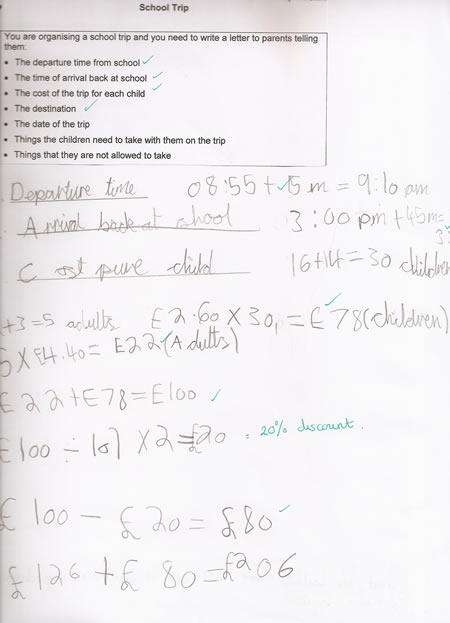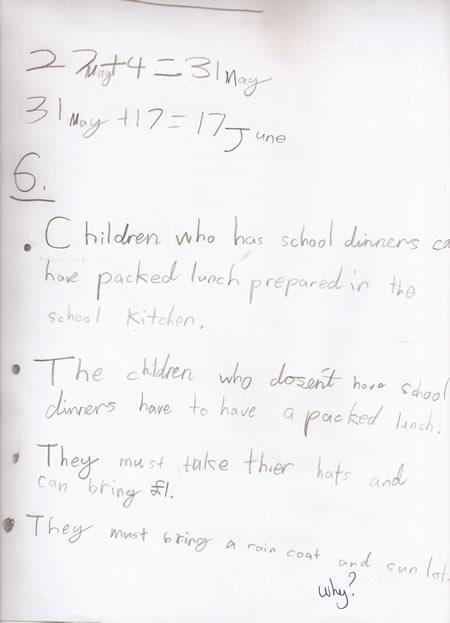Planning a School Trip
You are organising a school trip and you need to write a letter to parents to let them know about the day. Use the cards to gather all the information you need.
Problem
Planning a School Trip information cards
This problem has been designed to work on in a group of about four. For more details about how you might go about doing this, please read the Teachers' Resources.

You are organising a school trip and you need to write a letter to parents to let them know about the day.
You will need to print off and cut out the information cards from the top of this page.
Share the cards out between the members of the group.
In your group read through the cards and use the information on them to write the letter. You may find that some of the information on the cards is irrelevant!
We would love to see the letters that you write, so please send them in and describe how you tackled the activity.
This activity is taken from the ATM publication "We Can Work It Out!", a book of collaborative problem solving activity cards by Anitra Vickery and Mike Spooner. It is available from The Association of Teachers of Mathematics.
Getting Started
How will you sort out all this information?
What do you need to know? How can you find this out/work this out?
Don't forget to check your work as you're going along.
Student Solutions
Natalie and Holly from Queen's Manor Primary School sent this letter they had written:
Queens's Manor Primary School
Lysia Street
SW6
26/05/10
Dear Parents/Carers
On the 17th of June, Year 3 are going to the Golden Valley Wildlife Park. We will be leaving school at 10 past 9 and will arrive back at school at 3:45. It will cost £2.70 per child and 2 teachers and 3 adults will be joining them. The children will be able to bring a maximum of £1.00 spending money.
The children are to be provided with a packed lunch or the school will be happy to give your child a free packed lunch if they have a school dinner. Your child is not allowed to bring glass bottles.
Hope your child enjoys the school trip.
From Miss Natalie and Miss Holly
This letter is very clear - well done both of you for extracting the relevant information from all those cards. I'm not sure that the packed lunch will be free if the child has a school dinner, but I understand what you mean - children who have school dinner won't have to pay extra for a packed lunch. That's the way I understood it, anyway. Perhaps you don't agree?
Andrew and Laith from JESS Jumeirah Primary School in Dubai also worked on this activity. They sent in copies of their workings:


Here is the letter they wrote:
Teachers' Resources
Why do this problem?
This problem will encourage learners to organise information, identify redundant information and to check their work.
Many NRICH tasks have been designed with group work in mind. We have gathered together a collection of short articles that outline the merits of collaborative work, together with examples of teachers' classroom practice.
Possible approach
This is an ideal problem for learners to tackle in groups of four. Allocating clear roles can help the group to work in a purposeful way - success on this task could be measured by how effectively the group works together as well as by the letters they compose.
Alternatively, your focus for feedback might be mathematical, for example:
Make sure that while groups are working they are reminded of the need to be ready to present their work at the end, and that all are aware of how long they have left.
Key questions
If your focus is effective group work, this list of group work skills may be helpful. Ask learners to identify which skills they demonstrated, and which skills they need to develop further.
Possible extension
For a very challenging problem, some groups could try Zin Obelisk, which also requires them to draw conclusions from information.
Possible support
By working in groups with clearly assigned roles we are encouraging children to take responsibility for ensuring that everyone understands before the group moves on.
